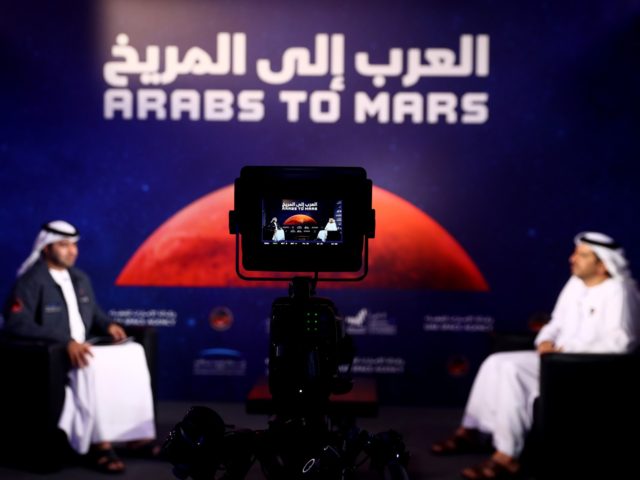The United Arab Emirates (UAE) announced on Tuesday that its unmanned spacecraft, named “Amal” or “Hope,” has entered orbit around Mars. The UAE thus became the fifth nation to reach Mars, and the first Arab nation to do so.
Success!
Contact with #HopeProbe has been established again.
The Mars Orbit Insertion is now complete.#ArabsToMars
— Hope Mars Mission (@HopeMarsMission) February 9, 2021
Crown Prince Mohammed bin Zayed extended his congratulations to the mission:
The entry of the Hope Probe into the orbit of Mars is a significant accomplishment in our nation’s history. This achievement was made possible by the Emirati pioneers whose work will inspire future scientists and engineers for generations. We are immensely proud of them.
— محمد بن زايد (@MohamedBinZayed) February 9, 2021
The journey of the Hope Probe took seven months, covered 300 million miles, and concluded with 27 minutes of deceleration to enter orbit around Mars. The stress of deceleration is always a source of concern for mission engineers, but the Hope Probe evidently completed the maneuver without damage and was able to resume communications with Earth after the expected delay of 11 minutes. Before the maneuver began, UAE Vice President Sheikh Mohammed bin Rashid Al Maktoum warned that the Hope Probe had only a 50 percent chance of achieving Mars orbit.
“But even if we could not enter the orbit, we’ve already made history. This is the farthest point in the universe to be reached by Arabs throughout their history,” he added. “Our goal is to give hope to all Arabs that we are capable of competing with the rest of the world.”
Mars is so far from Earth that it currently takes about 11 minutes for radio signals to pass between the two worlds, making precise remote control of a fast-moving space probe impossible, so successful orbital insertion depends on automated systems functioning properly to slow the spacecraft down enough.
The exact time delay, the precise distance a spacecraft must cover, and the deceleration needed to enter orbit are all variable because both Earth and Mars are constantly in motion around the Sun. The Hope Probe was moving at roughly 75,000 miles per hour relative to the Sun when the deceleration burn began. Further maneuvers are planned to adjust the size and shape of the probe’s orbit over the coming days.
UAE technology minister and space agency chairwoman Sarah Al Amiri said she was “grateful” for the success of the mission, and Hope’s arrival in orbit was “like a weight of seven years has been lifted from my shoulders.”
“On arriving at Mars. I’m now truly looking forward to the scientific discoveries. And I truly hope this mission will impact an entire generation to strive to do things that are even bigger,” she told the BBC on Tuesday.
“As a young nation, it is a particular point of pride that we are now in a position to make a tangible contribution to humanity’s understanding of Mars. This also marks an important point for the Emirates to continue the drive to diversify its economy utilizing science and technology,” Al Amri said in her official statement.
The $200 million UAE mission to Mars has an exceptionally high number of female scientists. Al Amri estimated the science team is about 80 percent women. “They are there based on merit and based on what they contribute towards the design and development of the mission,” she said.
The probe is designed to gather data about the Martian atmosphere while it circles the planet, in addition to transmitting high-resolution images of the Martian surface as seen from space. Among other objectives, the Hope Mission plans to study how hydrogen and oxygen leak from the Martian atmosphere into space, and how the planet’s immense dust storms are formed. Scientists are hoping to compare and contrast their studies of Martian weather to Earth’s atmosphere.
Voice of America News (VOA) noted the UAE probe will soon have company, as spacecraft from the U.S. and China are right behind it:
A combination orbiter and lander from China is scheduled to reach the planet on Wednesday. It will circle Mars until the rover separates and attempts to land on the surface in May to look for signs of ancient life.
A rover from the U.S. named Perseverance is scheduled to land on the planet February 18. It will be the first leg in a decade-long U.S.-European project to bring Mars rocks back to Earth to be examined for evidence the planet once harbored microscopic life.
Data gathered by the UAE probe is scheduled to be released to the global scientific community in September.

COMMENTS
Please let us know if you're having issues with commenting.